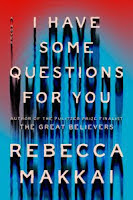 Francesca Segal is an award-winning writer and journalist. She is the author of two critically acclaimed novels, The Innocents (2012) and The Awkward Age (2017), and a memoir of NICU motherhood, Mother Ship (2019). Her writing has won the 2012 Costa First Novel Award, a Betty Trask Award, and been longlisted for the Women's Prize.
Francesca Segal is an award-winning writer and journalist. She is the author of two critically acclaimed novels, The Innocents (2012) and The Awkward Age (2017), and a memoir of NICU motherhood, Mother Ship (2019). Her writing has won the 2012 Costa First Novel Award, a Betty Trask Award, and been longlisted for the Women's Prize.
Her new novel is Welcome to Glorious Tuga.
At the Guardian Segal tagged five favorite escapist books, include:
Beautiful Ruins by Jess WalterRead about the other entries on the list.
Oddly, another novel in which celebrities collide with civilians. Pasquale runs the hotel Adequate View in a tiny Italian village, to which tourists mostly come by accident, thinking it somewhere else. It is “about” this earnest, gentlemanly hotelier and his modest dreams of a cliffside tennis court, but it is also about Elizabeth Taylor and Richard Burton, failure and comebacks, writing, success, fatherhood, and second chances.
Beautiful Ruins is among Taylor Jenkins Reid's five top novels about fame.
--Marshal Zeringue












.jpg)







































